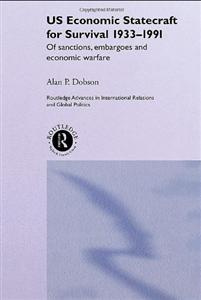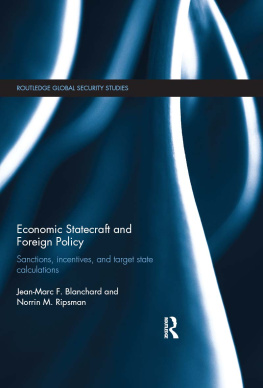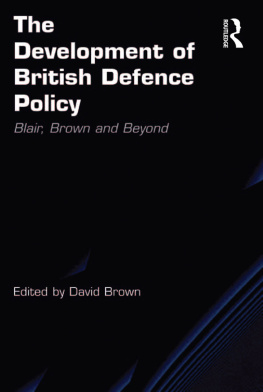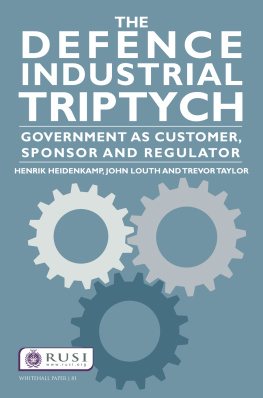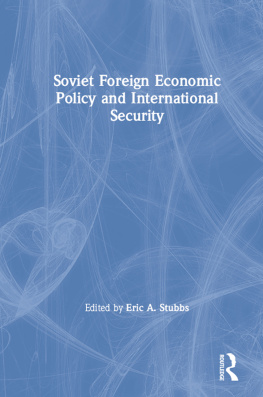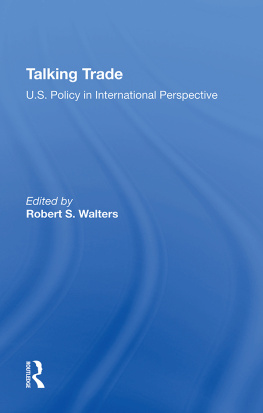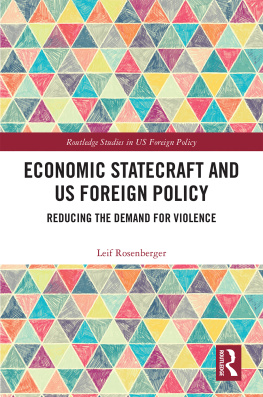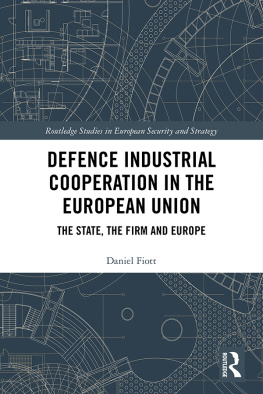Acknowledgements
This book has been a long time in coming. When I started research back in 1990, I was a lecturer in the Department of Political Theory and Government at the University of Wales, Swansea. In 1994-5, I had sabbatical leave, which allowed me to complete two other projects, and also move this one forward. In 1997 I enjoyed a Senior Research Fellowship in Oslo funded by the Norwegian Nobel Institute, which enabled me to write Chapters 5 and 6. In 1999 I received an Arts and Humanities Research Board Sabbatical Scheme Award, which gave me six months of leave funded jointly by the AHRB and the University of Dundee. This allowed me to complete the first full draft of the book. Along the way I also had grants from the British Academy, the Harry S.Truman Library and Foundation, and the Franklin D.Roosevelt Library and Foundation. Without these awards I could not have written what follows.
It is also important to register my gratitude for the support and faith in me of my publisher, Routledge/Taylor & Francis. Throughout they have been patient and understanding, as one deadline superseded another. They have received two other books from me since the signing of the contract for this (one of which was not foreseen in 1990), but, nevertheless, their patience has been much appreciated.
Chapters, or the whole manuscript, have been read by friends: Steve Marsh, Tom Zeiler, Saki Dockrill, Ian Jackson, Norrie MacQueen, and, last but by no means least, my long-standing intellectual mentor Charles Reynolds, who commented extensively on Chapter 11. Two anonymous readers for Routledge/Taylor & Francis also deserve a mention for their constructive and painstaking comments, which helped to improve the manuscript in its final editing. The help I received was always constructive and to the point; the flaws that remain are my responsibility, and mine alone.
The 1990s was a busy decade for me, and writing was not always easy. Respite and sustenance from friends and family kept me sane at moments of desperation when continuing the explanation seemed beyond my grasp. Most of all, thanks go to Bev and our girls, Naomi, Jessica and Becky for their love and support, and good fun.
Alan Dobson Dundee August 2001
10. Through the second Gold War to liberation
unless the Soviets recognize that it [the invasion of Afghanistan] has been counter-productive for them, we will face additional serious problems with invasions or subversion in the future.
President Carter, Diary 3 January 19801
Many people at the top of the Soviet hierarchy were genuinely afraid of America and Americans. Maybe this shouldnt have surprised me but it did.
Ronald Reagan2
The fact that most embargoes are considered failures is largely explained by the decentralised decision-making of the market economies. Unless there is state trade or perfect cooperation between exporters and importers, trade flow accommodation eventually occurs.
This favours the target country and makes the embargo inefficient.
There are other effects which also contribute to inefficiency, but trade flow accommodation is the major one.3
The Carter Administration responded promptly to the Soviet military action in Afghanistan. It was determined to convey to the world at large its moral outrage at the invasion, to make the Soviets suffer, and to draw its allies together in order to take stronger precautionary measures against the dangers of both the strategic build-up in the Soviet Union and its expansive tendencies.
On 2 January Carter recalled the US ambassador from Moscow for consultations, as a public sign of disapproval; others followed. On 3, 4, 8, 11, 20 and 21 January announcements came in staccato succession: the President asked the Senate to suspend consideration of the SALT 2 agreement; he boycotted US grain exports to the Soviet Union above the guaranteed 8 million tons stipulated in the 1975 agreement; he restricted Soviet fishing rights in US waters and Aeroflot landings in the USA; all validated export licences were suspended pending a 4-6 week review; the USA would not take part in the Moscow Olympics; and computer licences for the Kama River truck factory were revokedeven this list does not exhaust the range of responses. US rhetoric directed at the Soviets hardened dramatically. The China card was played with even more gusto. A range of measures to strengthen the Wests military position in the Persian Gulf and the Indian Ocean included taking steps to provide military aid both to anti-Soviet forces within Afghanistan and to the government of Pakistan. And diplomatic efforts were made to persuade allies to support the US stance and to tighten the strategic embargo through a reinvigoration of COCOM. On the evening of the 23 January, in his State of the Union Address to Congress, the President pronounced what became known as the Carter Doctrine.
Let our position be absolutely clear; an attempt by any outside force to gain control of the Persian Gulf region will be regarded as an assault on the vital interests of the United States of America, and such an assault will be repelled by any means necessary, including military force.4
The first Soviet invasion of a non-communist bloc country, fears that it could be a preliminary to others, and the Iranian revolution (which transformed a client state into a mortal enemy) plunged the whole Middle East and US policy for the region into turmoil. Western oil supplies, communications, the US strategic position, and its allies were all under threat, and there was fear of more possible Soviet adventurism. On 3 January the President noted in his diary that the Soviets might be tempted toward further aggression.5 Carter and his advisers judged resolute action to be vital. New and higher defence spending targets were set, the Administration pushed ahead with the Rapid Deployment Force, and progress along the path towards PD-59 was accelerated: it was promulgated in July 1980.
These military steps simply followed the direction that had already been set by those who were dissatisfied with detente and fearful of the deteriorating US strategic position. The clearest departure points from immediate past practice were in the economic and political spheres. Here the actions might be characterised as symbolic, punitive and longterm strategic measures.6 The most important symbolic action was the Olympic boycott, but this was not as powerful as it might have been, because many US allies either would not follow suit or, for legal reasons, could not. The grain embargo was meant to be the key punitive measure: an analysis of possible sanctions revealed that this was the only one which would significantly affect the Soviet economy.7 And yet during 1979-80 the Soviets managed to increase their imports to a record high of 30 million tons, and their livestock levels were higher at the end of 1980 than at the start of the year; this was achieved by paying more for their imports in the short term, but the Soviet consumer did not suffer. Meanwhile, grain and rice contracts with Argentina, Brazil, India and Canada exposed divisions among the free-world countries, strengthened the Soviet position in the long-term through supply diversification, and lost US farmers much of the Eastern bloc market.8 The long-term US goal of reinvigorating the Western multilateral embargo and expanding its scope had only limited success, and this also exposed differences and caused much friction among the Western allies.
On the basis of these consequences one might be tempted to agree with those who, like Lundborg, conclude that sanctions and embargoes are extremely difficult tools to wield effectively, and that Carter might have done better to adopt a lower-key approach, like Johnson had done at the time of the 1968 Soviet invasion of Czechoslovakia. However, this would be to fall into error: it would oversimplify the kind of response that Carter wanted to make by using inappropriately narrow criteria to analyse the goals of his actions. Such an appraisal of the situation would overemphasize quantifiable observable consequences, rather than weighing in the balance the inside meanings of these three forms of action. My objective here is not to pass judgement on whether what Carter did was morally correct, appropriate or effective; it is to explain what actions his Administration thought were necessary, and to point out that some of them were not dependent upon strictly defined instrumental results. It is also important to note that the Administrations decision-making power was not totally autonomous: at least on the margin, domestic political pressures were significant in decisions about how the USA should respond. What Carter and his associates did cannot be reduced to neat calculations in simple instrumental terms about the effectiveness of the grain embargo or the longer-term strategic measures. Here, no less than in the symbolism of the Olympic boycott, the Administration was determined to convey messages to the Soviets, to allies, to the rest of the world, and to its own domestic audience. Only by appreciating these factors can one fully understand what Carter did. The grain embargo was not just a sanction to hurt the Soviets, nor were the longer-term economic defence measures solely intended to restrict their military capability; like so many other measures embodied in US economic defence policies over the years, these were multi-faceted instruments of economic statecraft, and they had an inner dimension as well as aiming for visible and quantifiable instrumental effects. These complexities are revealed in the way the members of the Administration discussed what actions to take and why they should take them. Another way of emphasising the point is to suggest thateven if Carter could have been fully aware of just how limited the immediate economic effects the embargo would be on the Soviets, and if he had calculated that in the longer term his actions would have strengthened Soviet economic autarky and weakened US agricultural exportshe would still have gone ahead with the embargo.9
Next page
